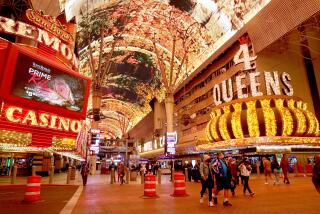Pastors Perplexed by Gambling Issues
- Share via
BILOXI, Miss. — Just blocks from the Gulf of Mexico beaches where casino lights beckon gamblers 24 hours a day, the Rev. Arthur Lewis finds himself in a quandary.
Lewis’ St. Paul United Methodist Church has a doctrine against gambling. But it also has members who work at the casinos, including Lewis’ daughter-in-law.
“One [congregation member] was working at McDonald’s making $5 an hour, then went to the casino, making $28,000 at the Beau Rivage,” he said. “I said, ‘Well, just try your best to do what you can for your family and put something back to finish your education.’
“I don’t know what to say. I pray about it a lot. Everybody’s fighting with this.”
Of his 366 church members, Lewis believes fewer than 10 work at the casinos. But others may frequent the establishments for the bargain-priced buffets or entertainment that is scarce elsewhere on the coast, practices Lewis believes can lead to the temptation of dropping a token in a slot machine.
Down the street, First Baptist Church also preaches against gambling, but it sold its property to the Beau Rivage casino for $7.5 million in August. First Baptist’s pastor, the Rev. Frank Gunn, refuses to discuss the deal, but church leaders have said the money will be used to build a bigger church.
First Baptist tries to offer some sensitivity to members of its 1,200-member congregation who work in the casinos, said spokesman R.B. Bryant.
“People have to earn a living,” he said.
The dilemma these churches face is not peculiar to Mississippi, said Barrett Duke, a specialist on gambling issues with the Ethics and Religious Liberty Commission of the Southern Baptist Convention, which denounces gambling.
In Las Vegas, where gaming provides most of the jobs, the Rev. Tony Forehand of Desert Hills Baptist Church said he tries to focus less on the sin of gambling and more on its effect on people.
“We deal with the frustration,” Forehand said. “I see more frustration from the people who have to work there. They don’t want to be in that environment. You just gotta keep pointing them back to Jesus.”
Mississippi’s casino industry, which began in 1992, directly created 38,000 jobs, said Ernie Stebbins, executive director of the Mississippi Gaming Association in Jackson. And an additional 22,000 jobs have been created by companies that supply goods and services to the casinos, he said.
Gambling’s economic impact in Mississippi is probably most evident in Tunica County. Once a land of poverty with double-digit joblessness, it now is a vacation destination with casinos offering gambling, boxing, golf and musical entertainment.
Tunica County now has an unemployment rate of just 4.2%, but the Rev. Paul Husband of Tunica Presbyterian Church still stands firm against casinos.
Husband, who leads a congregation of 121, said the increase in jobs is not worth the problems that accompany gambling, like crime and a breakdown of the family.
“There are a lot of minimum-wage workers saying ‘I can’t wait to get my paycheck. I’m going to hit it big tonight,’ ” Husband said.
Still, he tells members who are employed at the casino they must follow their conscience.
“If your conscience doesn’t condemn you and you’ve got to feed your family, I’m not going to tell somebody to quit their job,” Husband said.
Unlike the Baptists and Methodists, the Catholic Church has never condemned gambling, said Bishop Joseph Howze of the Catholic Diocese of Biloxi.
“Taking chances is not sinful,” said Howze. “The Catholic Church all across the country has been playing bingo for generations.”
Gambling is no different from purchasing stocks, bonds and insurance, Howze said.
More to Read
Sign up for Essential California
The most important California stories and recommendations in your inbox every morning.
You may occasionally receive promotional content from the Los Angeles Times.












